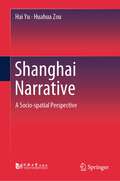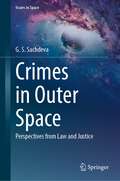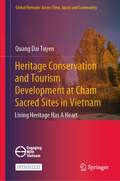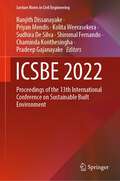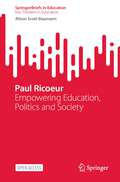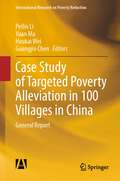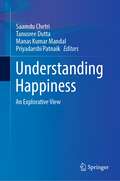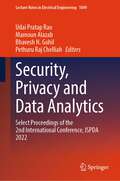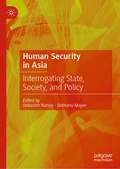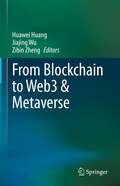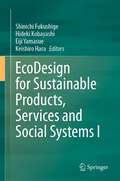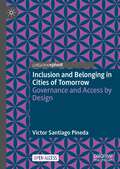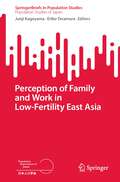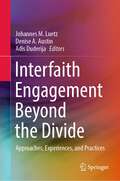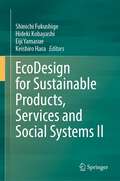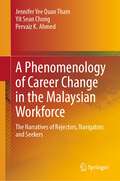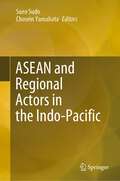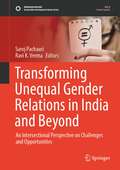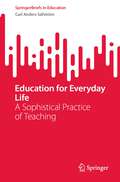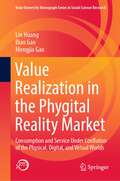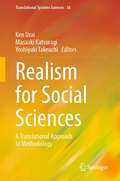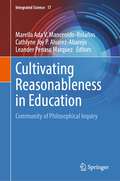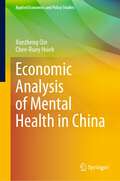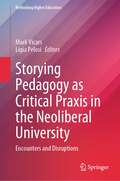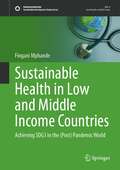- Table View
- List View
Shanghai Narrative: A Socio-spatial Perspective
by Hai Yu Huahua ZouThis book focuses on urban development in Shanghai over the past four decades, which is composed of two major development processes—the development of new spaces and the renewal of old ones. Seeking to bring the concept of space back into social analysis, the book explores changes affecting communities, interpersonal interactions, lifestyles and social mindsets in Shanghai from a spatial perspective. What’s more, all these social themes are presented using a narrative of spatial representation and spatialization. The book combines both academic and documentary-style contributions. It also provides cutting-edge research on the most representative case in Shanghai. As the book demonstrates, the story of social spaces in Shanghai is more than a combination of social analysis and spatial analysis but also involves historical analysis and contemporary narrative.
Crimes in Outer Space: Perspectives from Law and Justice (Issues in Space)
by G. S. SachdevaThis book flags and contemplates the lurking problem of space crimes that may escalate and expand with diversification of space activities, greater footfall on the celestial bodies and passage of time, for the lack of appropriate solutions. It appraises the incumbent problems to evolve solutions and make recommendations regarding space crime situations. Recognizing current situation where commercial space travel has commenced, and space tourism is not far behind, the book takes a pole position on discussing the topic with its endemic challenges. Space transportation is expected to lead to commercial mining of celestial mineral resources from the Moon and asteroids, as has been found technically feasible and commercially viable. Space-specific products have been identified for industrial mining, processing, and manufacturing, for which manpower would be necessary, howsoever minimal, despite artificial intelligence devices. Blueprints for space habitations on the Moon and Mars are being prepared. In this scenario, where outer space and celestial bodies may soon be inhabited by multi-nationality, multi-ethnic and multi-cultural groupings of tourists, workers, and residents, given cramped and not so comfortable or private living spaces, attitudinal disparities and conflicting beliefs, differences, disputes, conflicts, and crimes are sure to raise their head. Economic activity and business culture may usher in crimes of competition and spying on intellectual property. Space crimes through technologies like cyber, lasers, etc., may also permeate the space domain for ill-intentioned abuses. The criminals may be individuals or collective groups or incognito terrorists. The book also discusses crimes and near-crimes that have already occurred in space but have been ignored or condoned. Absence of sovereignty on celestial bodies coupled with crimes in space or on celestial bodies, presents problems of jurisdiction, extradition, and other legal procedures. The dilemma of multi-national judicial systems, legal codes and norms of social justice need to be resolved by a specialized treaty reconciling major bends in the existing system vis-à-vis the nature of space crimes. Limitations in handling such crimes by the existing judicial system under established doctrines of international law by International Court of Justice or International Criminal Court, is highlighted in the book. It has strong take-aways for research scholars, law fraternity, diplomatic corps, judicial administration, policy-makers and the political class, enabling them to pro-actively initiate action for suitable answers.
Heritage Conservation and Tourism Development at Cham Sacred Sites in Vietnam: Living Heritage Has A Heart (Global Vietnam: Across Time, Space and Community)
by Quang Dai TuyenThis open access book considers the growing field of heritage tourism from community perspectives. It explores how the Cham—Vietnam’s large ethnic minority—reconcile their needs for economic development with the boundaries circumscribed by their traditional culture. It examines struggles that local minority stakeholders like the Cham face when trying to participate in areas of development that typically fall under State control. How will tourism affect the ancient sacred spaces that are the Cham’s lifeblood? In what areas is their participation permitted? From what areas are they excluded? Through a novel mix of indigenous methods, participant observation, local voices, and rich ethnographic description, this book provides a rare glimpse into the discourses that have been percolating throughout the community in recent years. The relevance of this study extends beyond the Cham community, and aims to resonate with experiences of the myriad indigenous and minority communities around the world who face similar issues with heritage conservation and tourism development. This book is of interest to students and researchers of heritage studies, tourism management, cultural studies, Asian studies, as well as policymakers, and academicians seeking current research on the connections between culture, conservation, sustainable development, and tourism.
ICSBE 2022: Proceedings of the 13th International Conference on Sustainable Built Environment (Lecture Notes in Civil Engineering #362)
by Ranjith Dissanayake Priyan Mendis Kolita Weerasekera Sudhira De Silva Shiromal Fernando Chaminda Konthesingha Pradeep GajanayakeThis book highlights the latest knowledge and innovations in the fields of civil engineering and construction industry striving for a sustainable built environment. It consists of high quality and innovative research findings selected from the proceedings of the 13th ICSBE 2022 under the themes of sustainable construction, urban green infrastructure and planning, rainwater harvesting and water conservation, high-performance concrete, indoor environmental quality and indoor plants, wind and hydro-power energy, waste and wastewater management for enhanced sustainability, impacts of climate change, carbon footprint, global climate model and landscaping, material flows and industrial ecology, sustainable materials, etc.
Paul Ricoeur: Empowering Education, Politics and Society (SpringerBriefs in Education)
by Alison Scott-BaumannThis open access book employs Paul Ricoeur's methodologies to identify, challenge, and replace with responsible language the many continuing abuses of power, including in the university curriculum and in the international discourse of right-wing populism. Using Ricoeur’s philosophy, the book provides a meta-frame for current debates about the university and a pragmatic micro-frame for supporting staff and students to develop important conversations on campus. It introduces the Community of Inquiry approach and describes its use to engage with complex ideas on which society has recently become silent. By contrasting Ricoeur’s work on Algeria and his work in Chicago, USA, .a bias blind spot is revealed in his desire for dialectical balance and reciprocity. This prevented him (and for some years the author) from accepting the connections between colonialism, slavery and racism and the urgent need for reparative justice. With Ricoeur, the readers can think differently: how to recognize and tackle racism and the democratic deficit, how to reduce epistemic injustice by learning how to speak out, how to move away from forced polarities and develop a pedagogy of hope as well as an acceptance of provisionality and the intractability of certain existential problems.
Case Study of Targeted Poverty Alleviation in 100 Villages in China: General Report (International Research on Poverty Reduction)
by Peilin Li Yuan Ma Houkai Wei Guangjin ChenThis book is the general report of the targeted poverty alleviation and elimination project of 100 villages, presenting the overall progress of poverty alleviation and development of all sample villages in the tide of poverty alleviation. From 2016 to 2018, the project selected 104 poor villages (including those out of poverty) across the country to carry out national research and recorded the great changes in more than 100 poor villages in recent years with steps, nib and lens. Based on questionnaire survey data and data from village research reports, the book describes the basic village situation, poverty situation, village-level poverty management and assistance measures, causes of poverty and assistance measures, progress and results of targeted poverty alleviation in 100 poor villages across China since 2016.
Understanding Happiness: An Explorative View
by Saamdu Chetri Tanusree Dutta Manas Kumar Mandal Priyadarshi PatnaikThis book provides a comprehensive and enriching understanding of the construct of happiness from diverse perspectives. It provides readers with an overview of the issues, problems, and challenges related to well-being and happiness. The book is divided into three sections. It brings together researchers and practitioners from various disciplines, including psychology, sociology, and development studies. Each section includes chapters from leading academicians from across the world. The first section helps the reader understand happiness from a neuroscientific perspective and explores the relationship between happiness and subjective well-being. The second section of the book discusses the importance of building personal resources for happiness from a positive psychology point of view. The last section examines the importance of happiness in the workplace and suggests a sustainable development plan for happiness. It is a must-buy book for individuals nurturing critical thought and searching for a quintessential understanding of happiness. It presents a unique contribution to the literature with its multidisciplinary focus on specific topics.
Security, Privacy and Data Analytics: Select Proceedings of the 2nd International Conference, ISPDA 2022 (Lecture Notes in Electrical Engineering #1049)
by Udai Pratap Rao Mamoun Alazab Bhavesh N. Gohil Pethuru Raj ChelliahThis book constitutes refereed proceedings of the International Conference on Security, Privacy and Data Analytics, ISPDA 2022. The volume covers topics, including big data and analytics, cloud security and privacy, data intelligence, hardware security, network security, blockchain technology and distributed ledger, machine learning for security, and many others. The volume includes novel contributions and the latest developments from researchers across industry and academia working in security, privacy, and data analytics from technological and social perspectives. This book will emerge as a valuable reference for researchers, instructors, students, scientists, engineers, managers, and industry practitioners across the globe.
Human Security in Asia: Interrogating State, Society, and Policy
by Debasish Nandy Debtanu MajeeThis book discusses Human Security from a theoretical perspective. It builds theories in order to understand a phenomenon in a structured and well-ordered way. It sheds light on the conditions of the economy, food, health, community, environmental and political security in Asian states. It explores the idea of human security to understand the issues jeopardizing an individual’s security in the Asian continent and suggests policies to overcome these problems. This book argues that the nature of the government and the constitution are equally essential in ensuring the human security of a country. Some countries in Asia are not only economically vulnerable but also politically disrupted. The issues of hunger, poverty, illiteracy, militancy, terrorism, and ethnoreligious conflicts have posed threats to human security. The pandemic COVID-19 has brought a great humanitarian crisis. The role of the Asian states in combatting COVID-19 and protecting public health is highlighted in this book. With a multidimensional outlook this edited volume attempts to delineate an interdisciplinary discourse of human security in an Asian context.
From Blockchain to Web3 & Metaverse
by Huawei Huang Jiajing Wu Zibin ZhengThe Metaverse seamlessly integrates the real world with the virtual world and allows avatars to engage in a broad range of activities including entertainment, social networking, and trading. In this book, we dive into the Metaverse by discussing how blockchains connect various Metaverse components, digital currencies, and blockchain-empowered applications in the virtual world. On the other hand, Web3 has also attracted considerable attention due to its uniquely decentralized characteristics. The digital economy, currently undergoing a rapid development, is a critical driver to highly efficient societies. It is imperative that we investigate how to use Web3 technologies to address the critical concerns encountered during the development of the digital economy by fully exploring Web3. In this book, we also share insights into the Web3-based ecosystem in the Metaverse; topics of interest include decentralized finance, digital assets, the asset-trading market, etc. Unlike most works on the subject, this book mainly concentrates on insights and discussions regarding blockchain, the Metaverse and Web3. In other words, it focuses on using blockchain technologies to enable an ecosystem for both the Metaverse and Web3. Topics addressed include blockchain fundamentals, smart contracts, value circulation in the Metaverse, the connection between the Metaverse and Web3, the establishment of the Metaverse on the basis of blockchain technologies, decentralized autonomous organization, decentralized storage, digital economy, Web3-based economic systems for the Metaverse, etc. This book will be a valuable resource for students, researchers, engineers, and policymakers working in various areas related to blockchain, the Metaverse and Web3. We hope that it will also inspire readers from academia and industry alike, and ultimately help them create a truly open, fair, and rational ecosystem for the Metaverse and Web3.
EcoDesign for Sustainable Products, Services and Social Systems I
by Shinichi Fukushige Hideki Kobayashi Eiji Yamasue Keishiro HaraThis 2-volume book highlights cutting-edge ecodesign research and covers broad areas ranging from individual product and service design to social system design. It includes business and policy design, circular production, life cycle design and management, digitalization for sustainable manufacturing, user behavior and health, ecodesign of social infrastructure, sustainability education, sustainability indicators, and energy system design. Featuring selected papers presented at EcoDesign 2021: 12th International Symposium on Environmentally Conscious Design and Inverse Manufacturing, it also includes diverse, interdisciplinary approaches to foster ecodesign research and activities. In the context of Sustainable Development Goals (SDGs), in particular SDG 12 (Responsible Consumption and Production), it addresses design innovations for sustainable value creation, considering technological developments, legislation, and consumer lifestyles. Further, the book discusses the concept of circular economy, which aims to develop circular business models for resource efficient society by taking advantage of digital technologies including artificial intelligence, internet of things, digital twin, data analysis and simulation. Written by experts from academia and industry, Volume 1 highlights sustainable design such as product and process design, collaborative design, sustainable innovation, digital technologies, design methodology for sustainability, and energy system design. The methods, tools, and practices described are useful for readers to facilitate value creation for sustainability.
Inclusion and Belonging in Cities of Tomorrow: Governance and Access by Design
by Victor Santiago PinedaThis open access book uncovers the historical context and entrenched beliefs that have perpetuated exclusionary urban landscapes and disadvantage for marginalized groups. It offers an in-depth exploration of the intricate interplay of geographical space, recognizing its pivotal role in shaping our cities and exacerbating spatial injustice. The construction industry, a vital agent in forging accessible environments, often falls short in accommodating persons with disabilities and older individuals. This important book underscores the urgent need for integrated approaches woven into the fabric of cities, companies, and the construction industry itself, to ensure universal accessibility. Drawing upon practical strategies and compelling case studies, the book presents actionable frameworks such as the DisCo Policy Framework and the Iceberg of Inequality Model, facilitating the assessment of progress towards achieving radical inclusion. Inviting readers to embark on a journey into the cities of tomorrow, where inclusion and belonging are the norm, it concludes with a simple idea: the future is accessible.
Perception of Family and Work in Low-Fertility East Asia (SpringerBriefs in Population Studies)
by Junji Kageyama Eriko TeramuraThis book is the first of its kind to incorporate subjective well-being (SWB) data to comprehensively explore perceptional factors that relate to fertility behavior in East Asia. The advantage of SWB data lies in the accessibility to rich information regarding perceptions, attitudes, and behaviors. With this advantage, the book inquires into the perceptions toward family and work and explores the attitudes that lead to low fertility in the region.To this end, first a comparative analysis with international cross-sectional data is performed and the East Asian characteristics of family and work perceptions are documented. Then, three democracies in the region are focused on—Japan, South Korea, and Taiwan—to investigate the relationships between cultural orientations, work–life balance, and fertility outcomes with panel data. In addition, East Asian results are compared with those in India, which has also been experiencing a rapid transition from a traditional society to an industrial one. The results support the idea that the friction between persistent gender-based role divisions and socioeconomic transformation in East Asia makes it difficult for women to balance family and work, prompting fertility decline to the lowest-low level in the region.
Interfaith Engagement Beyond the Divide: Approaches, Experiences, and Practices
by Johannes M. Luetz Denise A. Austin Adis DuderijaThis book features reflections by scholars and practitioners from diverse religious traditions. It posits that the global challenges facing humanity today can only be mastered if humans from diverse faith traditions can meaningfully collaborate in support of human rights, reconciliation, sustainability, justice, and peace. Seeking to redress common distortions of religious mis- and dis-information, the book aims to construct interreligious common ground ‘beyond the divide’.Organised into three main sections, the book features sixteen conceptual, empirical, and practice-informed chapters that explore spirituality across faiths and cultures. Chapter 1 delineates the state of the art in relation to interfaith engagement, Chapters 2–8 advance theoretical research, Chapters 9–12 discuss empirical perspectives, and Chapters 13–16 showcase field projects and recount stories and lived experiences.Comprising works by scholars, professionals, and practitioners from around the globe, Interfaith Engagement Beyond the Divide: Approaches, Experiences, and Practices is an interdisciplinary publication on interreligious thought and engagement:Assembles a curated collection of chapters from numerous countries and diverse religious traditions;Addresses interfaith scholarship and praxis from a range of interdisciplinary perspectives;Comprises interfaith dialogue and collaborative research involving authors of different faiths;Envisions prospects for peace, interreligious harmony in diversity, and a world that may be equitably and enduringly shared.The appraisal of present and future challenges and opportunities, framed within a context of public policy and praxis, makes this interdisciplinary publication a useful tool for teaching, research, and policy development. Chapter 16 is available open access under a Creative Commons Attribution 4.0 International License via link.springer.com.
EcoDesign for Sustainable Products, Services and Social Systems II
by Shinichi Fukushige Hideki Kobayashi Eiji Yamasue Keishiro HaraThis 2-volume book highlights cutting-edge ecodesign research and covers broad areas ranging from individual product and service design to social system design. It includes business and policy design, circular production, life cycle design and management, digitalization for sustainable manufacturing, user behavior and health, ecodesign of social infrastructure, sustainability education, sustainability indicators, and energy system design. Featuring selected papers presented at EcoDesign 2021: 12th International Symposium on Environmentally Conscious Design and Inverse Manufacturing, it also includes diverse, interdisciplinary approaches to foster ecodesign research and activities. In the context of Sustainable Development Goals (SDGs), in particular SDG 12 (Responsible Consumption and Production), it addresses design innovations for sustainable value creation, considering technological developments, legislation, and consumer lifestyles. Further, the book discusses the conceptof circular economy, which aims to develop circular business models for resource efficient society by taking advantage of digital technologies including artificial intelligence, internet of things, digital twin, data analysis and simulation. Written by experts from academia and industry, Volume 2 focuses on the sustainability assessment of product lifecycle, waste management, material circularity and energy efficiency, food and agriculture, user behavior and health, and transportation. The methods, tools, and practices described are useful for readers to facilitate value creation for sustainability.
A Phenomenology of Career Change in the Malaysian Workforce: The Narratives of Rejectors, Navigators and Seekers
by Jennifer Yee Tham Yit Sean Chong Pervaiz K. AhmedEvolution in economy, technology and social institutions over time have given rise to boundaryless and Protean careers that promote mobility and self-direction in managing one’s career. This has led to the phenomenon of career change whereby individuals undertake a shift from one field of work to a completely different field of work. In career change research, career changers have been studied as a collective, singular group undergoing a similar change experience, which neglects individual differences that may contrast the experience of change from one changer to another. Furthermore, the emotional experience that accompanies a career change has been examined with a primary focus on the role of positive emotions, which overlooks the role of negative emotions in career change. Thus, this book sheds light on three key narratives of career change; Rejectors, Navigators and Seekers, that were identified in a phenomenological study of career change amongst Malaysian working adults. Semi-structured interviews were conducted with 30 career changers across age, gender and ethnicity with a focus on how they made sense and meaning of their lived experience of career change within their environment and context. Each career change narrative was found to have different characteristics, motivations and behaviors respectively, which shaped their unique career change process. Negative emotions were also revealed as key drivers of the career change process, although each narrative expressed different types of negative emotions.Finally, the book also introduces an adaptive perspective to career development by way of the Adaptive Career Construal Model (ACCM) which was proposed based on the continuous bi-directional relationship between career decisions and career outcomes.
ASEAN and Regional Actors in the Indo-Pacific
by Sueo Sudo Chosein YamahataThis book discusses the shifting regional geopolitical engagements and development of rearranged connections emerging among ASEAN and non-ASEAN actors.First, the book focuses on the crucial discourse surrounding the Indo-Pacific region, including its challenges, continuity, and relevance. The discussion highlights the growing influence of regional actors such as India, Thailand, Japan, and the US, particularly in the context of a pressing question of collaboration versus containment amidst China’s rise. The book delves into various topics, such as geopolitical anxieties, economic strength, foreign policy, international relations, development, and security promotion in South and Southeast Asia, through the lenses of ASEAN centrality and the Indo-Pacific strategy.Second, the volume emphasizes on the escalating tensions and the worsening crises in the region that cause major anxieties and the subsequent realignment and new alignment of countries’ relationships. Among several chapters of the volume, a large Indo-China state, Myanmar, takes a special place in the book’s discussions as it has grown as an important ground for a resource/energy race among geopolitically strategic partners. Additionally, Myanmar has the potential to become a balancer in ASEAN. Therefore, any positive development and change in course of relations to Myanmar, particularly with its neighbors, Japan, and Russia, in both historical and contemporary contexts, can have a significant impact not only on Myanmar’s course towards peace, democracy, and security, but also regional stability. The editors and contributors examine the unique position of ASEAN, with a focus on ASEAN centrality as a platform for addressing anxieties and building relationships to bridge the gap between world and regional players, including both friends and foes.Overall, the volume provides valuable insights into the Indo-Pacific region’s complex dynamics, including cooperation and collaboration among regional actors for long-term stability and prosperity. The interdisciplinary composition of the book invites readers from various backgrounds to engage with constructive debates on general perception, contextual discussion, and the highlights of engaged research from local and international perspectives.
Transforming Unequal Gender Relations in India and Beyond: An Intersectional Perspective on Challenges and Opportunities (Sustainable Development Goals Series)
by Saroj Pachauri Ravi K. VermaThis book offers a unique intersectional perspective on gender equality, SDG5. It presents an intersection of gender with caste, class, region, ethnic and sexual identities, and other structural drivers of inequalities in various development sectors. It presents case studies and empirical findings from development practice and policymaking and highlights the challenges to implementing SDG5 in practice. It discusses policies to promote gender equality and prevent violence against women and girls, and women in decision-making and leadership positions. The chapters reinstate that gender equality is possible only if unequal gender norms are transformed to recognize women and girls as independent economic entities and not merely homemakers providing unpaid care. It also analyzes to deconstruct the idea of monolithic masculinity to recognize gender diversity and men’s role in providing care. The book shows how much has been achieved, yet how far is also left to go. It is an essential reference point for researchers, policymakers, students, and scholars across gender studies, women’s studies, and sociology.
Education for Everyday Life: A Sophistical Practice of Teaching (SpringerBriefs in Education)
by Carl Anders SäfströmThis book examines the role of teaching within public education. It critiques its function in today's educational policies and theories and establishes an alternative way of understanding teaching. It explores teaching from within a Sophist tradition of educational practice and thought.The first part of the book discusses the vital link between public education and democracy, the shifts in schooling's role in fostering competition and comparisons at the cost of social responsibility and democratisation. It identifies the driving force of those shifts as forces of aggression and destruction, central to a neoliberal ideology. The second part of the book argues for a practice of Sophistical teaching rather than Socratic teaching. It explores in-depth what it could mean to be teaching in an up-to-date sophist tradition of educational thought and practice.The book also includes insights for teaching to counter aggressive forces of nationalism, racism, and late capitalism's violence and the escalating climate crisis. Readers will be able to understand teaching within educational thought and precisely how different teaching forms can contribute to education as democratisation.
Value Realization in the Phygital Reality Market: Consumption and Service Under Conflation of the Physical, Digital, and Virtual Worlds (Kobe University Monograph Series in Social Science Research)
by Lin Huang Biao Gao Mengjia GaoThis book is a timely and much-needed comprehensive compilation that reflects the development of research on consumption and communication in the conflation of the real and digital worlds, bringing together the current state of thinking about the phygital reality market and the cutting-edge challenges that are involved. In this book, the term “phygital reality market” is used, implying that the physical, digital, and virtual realms are fused into one to recognize and understand the market with multiple or mixed realities. The concept of the phygital reality market captures the new realities that consumers are shopping, consuming, and living, and companies are competing within the physical, digital, and virtual marketplaces. The book covers the research on consumption, service, and communication in the phygital reality market and compiles the current state of thinking, challenges, and cases having to do with the acceptance and diffusion of new technologies of phygital reality. The interest in the phygital reality market, such as omnichannel retailing integrating physical stores and online services, has grown hugely over the last two decades, particularly since the coronavirus pandemic. COVID triggered severe social and economic disruption around the world but has accelerated the acceptance and diffusion of new technologies in the phygital reality market, where the physical, digital, and virtual worlds are conflated. Versatile problem solving and new challenges are reflected in the value realization process of innovation — in other words, widespread acceptance and diffusion of devices or services that embody new technologies. The excitement and hype associated with the metaverse have highlighted the need to understand the creation and adoption of new technologies in consumption and marketing, recognition of the foundational role of new technologies in driving consumer behavior, and marketing theory and practice in value realization as a vital part of the process of digital transformation.
Realism for Social Sciences: A Translational Approach to Methodology (Translational Systems Sciences #36)
by Ken Urai Masaaki Katsuragi Yoshiyuki TakeuchiThis book discusses the growing interest in realism in social sciences of the twenty-first century. The first part of this book provides recent discussions on realism in philosophy. The second part describes specific problems that have returned to realism in various fields of the social sciences, such as economics, cultural anthropology, management science, and statistics. This book clarifies what kinds of movements are taking place and consequently the direction in which the social sciences are heading in the future. Readers would also find that there is great diversity in the way realism and reality are perceived and understood, depending on the objectives and circumstances of each field of social science. This suggests that rather than having a unified view (stance) of realism and reality, it may be more meaningful to value the differences, diversity, and range itself. Therefore, this book does not present a unified view of realism, reality, and actuality. Although the definitions of realism and reality may differ from chapter to chapter, this represents a corner of the current state of the social sciences. This book is unique in that it examines how the issues of realism and reality are viewed, understood, and dealt with in the various fields of social science, instead of examining them by philosophers and philosophers of science. This would clarify how philosophical discussions have been translated into the various fields of social science.
Cultivating Reasonableness in Education: Community of Philosophical Inquiry (Integrated Science #17)
by Marella Ada V. Mancenido-Bolaños Cathlyne Joy P. Alvarez-Abarejo Leander Penaso MarquezThis book focuses on the real-world application of the Philosophy for/with Children (P4wC) pedagogy to cultivate reasonableness in individuals through communities of philosophical inquiry. It presents a collection not only of theories but, more importantly, of experiences, discoveries, and innovations on P4wC by scholars, trainers, advocates, and practitioners around the world. Each chapter provides readers with insights and lessons that have resulted from the continuous application, exploration, and enrichment of the concepts, principles, and practices that were developed by Matthew Lipman and Ann Margaret Sharp into what P4wC is today - a dialogic pedagogical approach that may just be what is needed at a time when reasonableness and dialogue are essential to maintaining global stability and progress. In this light, this book also looks into how the P4wC approach can be practiced with adults such as when it is employed in various settings or contexts such as in business consulting, textbook writing, peace education, and extremism prevention, among others. Furthermore, this book also features chapters that discuss how the P4wC pedagogy can be beneficial once integrated into processes such as classroom teaching, teacher education, bioethics, and employee education. This book provides valuable insights about how reasonableness that is cultivated through building communities of philosophical inquiry in education can be a powerful tool for nation-building and social transformation.
Economic Analysis of Mental Health in China (Applied Economics and Policy Studies)
by Xuezheng Qin Chee-Ruey HsiehThis book uses an economic approach to analyze the socioeconomic causes and consequences of mental health disorders in China, with a special focus on mental depression. Based on a nationally representative dataset, we first investigate the prevalence and distribution of depression and depressive symptoms among China’s adult population, and then use several econometric methods to estimate the multi-dimensional disease burden of the mental disorder, such as its direct medical costs, its indirect economic costs, and its hidden costs on social trust and life satisfaction. In addition, we specifically address the socioeconomic determinants of mental health by examining how the relative and absolute economic status may determine people’s mental depression. Lastly, we propose an analytical framework to evaluate the four major hurdles that cause the treatment gaps of mental health care, and discuss the policy options to overcome such hurdles and to address the unmet mental healthcare needs in China and other developing countries. The book may facilitate our understanding on the complex determinants and implications of the rising prevalence of mental health disorders in developing countries like China. In addition to the students, teachers, and researchers in the fields of health economics and public health, the book may also be of interest to health policy makers and non-government agencies who are concerned with addressing the global mental healthcare challenges using economic policy tools.
Storying Pedagogy as Critical Praxis in the Neoliberal University: Encounters and Disruptions (Rethinking Higher Education)
by Mark Vicars Ligia PelosiThis book examines how teaching and learning and teacher and student identities are being reframed in higher education by neoliberal policies and practices. It shares how teachers perform teaching and learning duties in relation to prescribed institutional policies and how teachers insert dissonant pedagogies as a critical practice.The book explores narrative pedagogy as a disruptive presence and a space for critique. It interrogates personal/professional experience of educational systems that present educators juggling complexity and meeting competing demands to make learning meaningful for students. Each contribution will act as a counterpoint and provide a synoptic method for comparison. The book re-constructs meaning from the generic narrative of the public face of education, which homogenizes and diminishes collective understandings of teachers and teaching. This book provides a contemporary account of the social realities experienced within the higher education classroom across the globe.
Sustainable Health in Low and Middle Income Countries: Achieving SDG3 in the (Post) Pandemic World (Sustainable Development Goals Series)
by Fingani MphandeThis book highlights lessons from the COVID-19 pandemic and explains how these can be used to build sustainable health systems, especially in Low- and Middle-Income Countries (LMIC). It investigates the impact of outbreak response and management on health sustainability in LMIC from the perspective of SDG3: “Ensuring healthy lives and wellbeing for all at all ages”. Despite strides being made in some areas for SDG target 3.3 to fight communicable diseases, the COVID-19 pandemic has caused interruptions that will considerably affect vaccination coverage as well as the progress that was made, for example: in reducing malaria cases. Vulnerable populations who were already struggling to access their healthcare needs before the pandemic may face even greater challenges at present and in the years to come, post-pandemic. This book considers the progress on attaining the SDG3 targets, specifically: to improve early warning systems for management of national and global health risks, and the effect of pandemics - including but not limited to the COVID-19 pandemic - and emerging disease outbreaks. It explores the weaknesses and strengths in LMIC and how to strengthen capacities in these countries. The author also investigates and proposes approaches that can, or should, be implemented to ensure sustainable health systems in developing countries, including early warning systems, risk reduction, and the management of global and national health risks. This book is of great interest to public health professionals, infectious diseases experts, and epidemiologists, as well as students and researchers of public health systems and healthcare infrastructure in developing countries.
